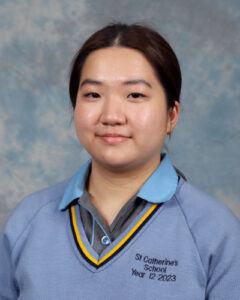Students Make Global Shortlist
In early August we received the exciting news that two of our senior Humanities students, Leanne Hiew (Year 12) and Rhea Werner (Year 11), have been shortlisted for the esteemed John Locke Essay Competition.
Run by Oxford and Princeton Universities and the John Locke Institute, the Competition is the most prestigious high school essay competition in the world.
Each year, high school students are invited to respond to a set list of Humanities topics across a range of Humanities disciplines. The 2,000 word essay mirrors what is required in Liberal Arts courses at University.
This year over 19,000 students submitted their essays. As part of being shortlisted, both Leanne and Rhea have been invited to Oxford for the prize giving. The girls will be able to discuss their essays with Oxford, Princeton, and Cambridge Professors. They also have the opportunity to meet the admissions chairs of the departments for Oxford and Cambridge.
Leanne Hiew: Politics
After competing Units 3/4 Global Politics as a Year 11 student in 2022, Leanne developed an interest in Chinese politics, and selected the following question from the set list:
‘If China becomes the leading superpower, what would that mean for the people who live there? What would it mean for everyone else?’
To respond to this essay, Leanne had to complete further background reading into Chinese history. In addition, while the VCE course tends to focus on concepts of power and sovereignty, her Locke essay permitted the use of further concepts from political science. Here is the conclusion from Leanne’s essay, which succinctly outlines her core thesis:
China’s ability to curtail obstacles to its power has strengthened its potential accession to the leading superpower. The improvement of internal material living standards would exalt the positive economic impacts of its ongoing growth. However, the CPC’s heightened ability to implement authoritarian policies, for what it perceives as favourable for the welfare of the people, is contrastingly viewed as detrimental to individual autonomy. Moreover, while its growth generates imperative economic benefits, the ideological dilemma between China and ideologically unaligned states diminishes their propensity to reproach China’s political ambitions as a world-leading power, at the expense of their sovereignty. Thus, the distinction between economic and political implications on internal and external stakeholders means the ultimate impact of China as the leading superpower is not entirely favourable nor entirely adverse.
Rhea Werner: Philosophy
Having her interest in philosophical questions piqued in the Year 9 Philosophy Elective Program, Rhea selected the question of free will and determinism as the subject for her Year 10 Extended Essay in English. This experience gave her the confidence to attempt the metaphysical topic of personal identity for the Locke Competition:
‘In what sense are you the same person today that you were when you were ten?’
To answer the question, Rhea had to delve back into the classical thinkers, where she then leveraged principles from Descartes, Locke, Parfit, Aristotle, and others to construct a compelling narrative around the subject of personal identity. Similarly, to Leanne, she had to go beyond the VCE curriculum (which just focuses on metaphysics) to encompass a socio-cultural view, making her essay highly original.
Here is Rhea’s introduction:
“To delve into the complexities of personal identity — its mutability and constancy — we must grapple with several key questions: What elements constitute a person? How do we define ‘sameness’? Does the identity of a person stand firm against change, succumb easily to it, or does its resilience depend on the nature of change itself? This essay aims to explore these questions, investigating the complex dynamics of personal identity in a temporally bounded universe.
A ‘person’ may be argued to be constituted by physical facts — such as spatiotemporal continuity — and psychological facets. These components are susceptible to changes. However, despite this fluidity, certain aspects such as the state of consciousness and symbolic identity remain constant. To establish sameness across time and physical change, this ‘self’ must be examined as both a sociologically imagined persona and a construct of the mind influenced by external factors.”
Student Independence
One of the strict conditions of the Essay Competition is that students must work independently. Thus, while they were able to consult us for tips on academic readings and concepts, both Leanne and Rhea had to complete the essay themselves, outside of class time, autonomously managing the research, planning and writing process.
We are extremely proud of the willingness of both Leanne and Rhea to challenge themselves to write on such intellectually rigorous topics. Given their plans post school to pursue studies in politics (Leanne) and Biology and Government (Rhea) they are well on the way to achieving their dreams.




